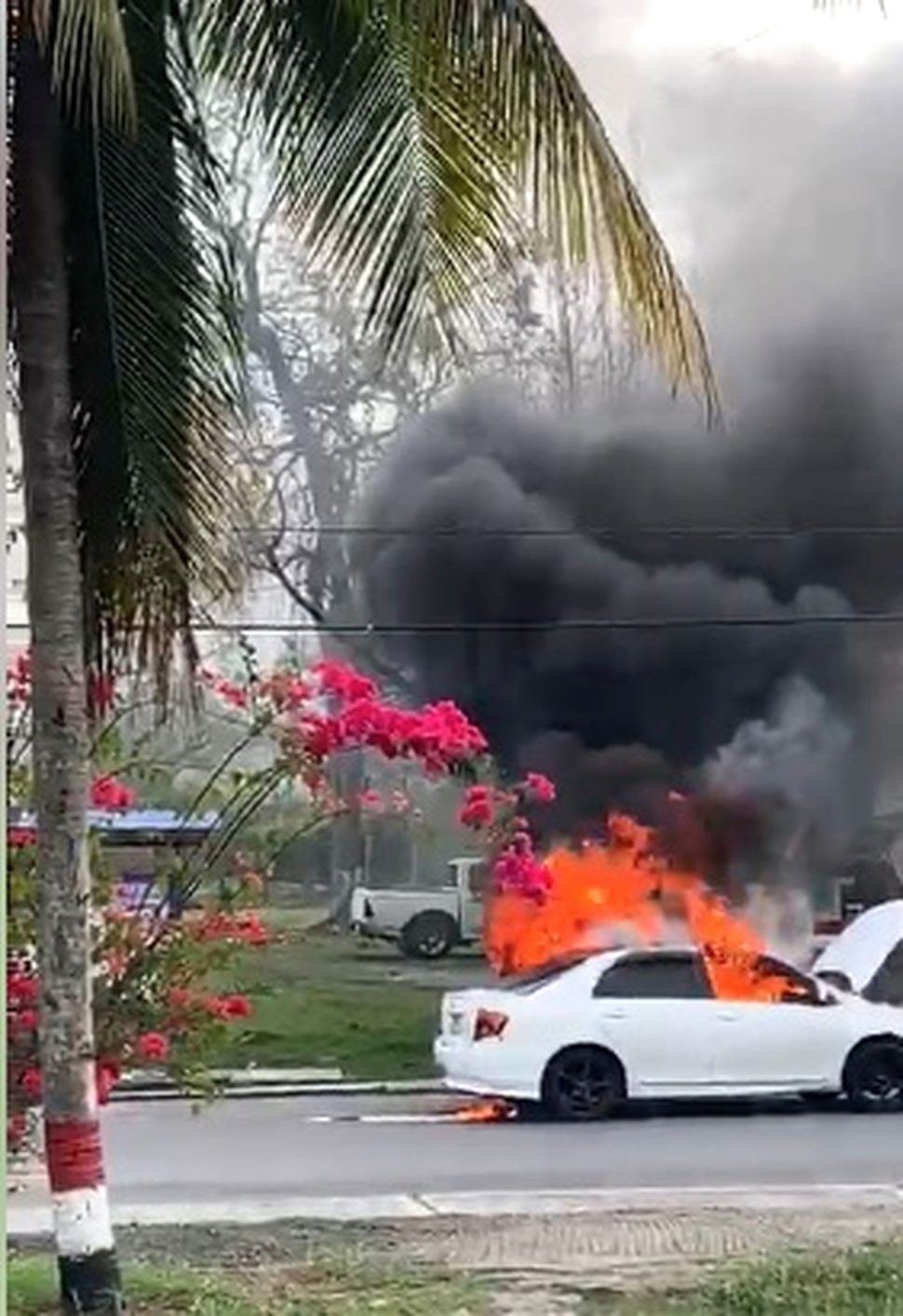(Trinidad Guardian) Widely shared social media posts blaming imported fuel for at least six incidents in recent months in which cars caught fire have been dispelled by mechanics who believe poor maintenance and shoddy modifications were done to the vehicles were likely the cause of the fires.
Ever since the first shipments of imported fuel arrived in the country on October 27 last year, a debate has raged over the quality. With the closure of Petrotrin, the Pointe-a-Pierre refinery which supplied the nation’s fuel has been mothballed. In the months since then, several videos have popped up on Facebook showing cars on fire and blaming those accidents on the imported fuel.
Last December 26, a short video of a burning car on the northbound lane of the Sir Solomon Hochoy Highway was posted on Facebook. One day later, a video showing a Nissan X-Trail on fire on South Quay, Port of Spain, was posted and since then there have been four other videos of burning vehicles.
The most recent was on March 20, when a car caught fire along the Rivulet Road in Couva.
The videos have attracted thousands of views and comments, with social media users speculating about the cause of this apparent increase in vehicle fires.
On a video of a burning Toyota Axio, one man wrote: “Next car on fire again this is about 17 vehicles I saw posted on fb on fire…this never use to happen under Petrotrin watch… now this new gas the government is importing is a nightmare to these drivers…”
On the March 20 fire, another user commented: “It’s d fuel people. Look at cars just burning down as we started importing fuel.”
Another pleaded for an investigation into the quality of the fuel, writing: “Someone needs to investigate the type of fuel we are receiving and if these cars were CNG also. Something not adding up too many vehicles on fire.”
However, Andre Toolsie, a mechanic and the owner of Striver’s Auto Garage in Princes Town believes the real cause of the car fires are mechanics using outdated tools and servicing methods on modern cars.
“Anytime I see a vehicle on fire, it is most likely because of work recently done on a vehicle. For instance, there are mechanics who do engine changes but they don’t have the correct tools to work on the vehicle so when they cut the fuel lines, they are just joining it and that can lead to fuel leakage which can start a fire,” Toolsie said.
“I have come across several cars where wires are left exposed when music systems are set up, where battery terminals are not grounded properly and these cause minor fires to start.”
He also dismissed claims that the imported fuel is inferior to the fuel that Petrotrin used to produce.
“Customers are complaining that fuel is burning out faster than before but that depends on the maintenance of the vehicle. I believe the fuel quality now is of better quality than what we were producing, I have personally seen it in the improvement of the mileage of my personal vehicle,” he said.
Owner of Chunks Auto Service, Krishna Subratie, said after hearing similar complaints, he offered three of his clients free service for their vehicles as part of a project to monitor fuel efficiency. After posting the offer on his Facebook page, Subratie selected one customer for the service. He also tested his theory that the servicing and maintenance of the vehicle are directly related to its fuel consumption on his own car.
“I did see a difference in the number of miles per tank of gas after the service. I used to get 270 km’s per tank and after the service the first time I filled up my tank, I got 305 km from that tank,” Subratie said. “Since then, I have been getting even more miles per tank.”
He explained that when vehicle manufacturers test a vehicle’s fuel efficiency, that vehicle is usually brand new.
“The vehicle needs to be maintained in a certain way in order for it to work the way it’s supposed to. When manufacturers are doing their tests those vehicles are 100 per cent clean for them to be able to get those type of numbers and when you have a vehicle and you don’t keep up on maintenance—keeping the intake manifold clean, free of dust or whatever residue—all that contributes to poor fuel economy.”
Subratie believes the quality of imported fuel is the same as the fuel Petrotrin used to produce.
“From using the local fuel to the one they are bringing in now, my mileage has remained about the same, I’m 100 per cent sure of that. I have been trying to advise customers that certain conditions, along with the maintenance, will cause them to burn more fuel.
“For example, you have two same types of vehicles, they take the same amount of fuel, one person goes from San Fernando to Port of Spain and the other goes from Maracas to Port of Spain every day. Let’s say they are both doing the same mileage but one person’s gas is finishing faster and that person would be the one from Maracas, simply because there are more hills on that side and the vehicle would use more gas to get more power to climb those hills.”
Subratie, a mechanic for about 13 years, does not believe that the imported fuel is causing fires.
“Unless it is a manufacturing defect, a lot of it is human error. People are doing work on vehicles that they are not qualified to do. Simple things like the battery clamp, if it is not properly secured and it moves and the positive touches any part of your vehicle, that can cause a fire,” he said.
He said a vehicle can catch fire because of fuel but only in specific circumstances.
“If you get into an accident and the fuel tank bursts and at that time something sparks and ignites it, then you will have a fire. To my knowledge and experience cars don’t just catch fire because of fuel. It could be a faulty fuel line or the battery or wire not grounded properly but once everything is working how it’s supposed too in the vehicle, the fuel will not cause a fire.”
In a statement yesterday, Paria Fuel Trading Company Limited said all the refined fuels it imports meets or exceeds market specifications.
The company ensures all cargoes/products are fully tested at the load port and the tests are witnessed by an independent inspector. The results are provided to Paria for review and prior to discharge, the products are again tested at the Guaracara laboratory, with tests again being witnessed by an independent inspector.
“To date, all the products imported have met and, in many cases, exceeded the contractual specifications particularly in relation to sulphur content. These specifications are in keeping with the Trinidad and Tobago Bureau of Standards (TTBS) specification for motor vehicles.
“We are bringing in a much better quality product than was produced at the Pointe-a-Pierre refinery in recent times.”
Also weighing in on the quality of the fuel was Unipet chairman, Dr Afraz Ali, who described the social media claims about imported fuel causing fires as nothing more than anecdotes.
Ali said to date, no one has been able to provide any evidence that there is something wrong with the quality of the imported fuel.
“We at Unipet have not had that experience. I’m not sure where that is coming from. As far as the comments are concerned, those are anecdotal, I don’t think anyone has come out and proven those allegations that are being made on social media,” he said.
Ali said Unipet has been using a double filtration system for the past eight years which has been proven to improve the quality of fuel delivered to customers.
“That is something that we have independently tested and we have certificates that can substantiate the fact that our double filtration actually improves the quality of fuel to the customer,” he said.








